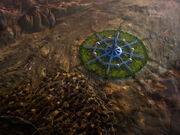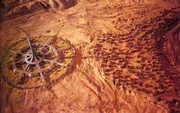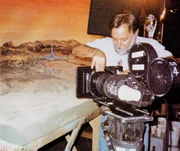mNo edit summary |
m (→Farpoint maquette and set: frm.) |
||
| Line 14: | Line 14: | ||
=== Farpoint maquette and set === |
=== Farpoint maquette and set === |
||
| − | [[File:Farpoint Station concepts by Rick Sternbach.jpg|thumb|left|Sternbach's exterior design]] |
||
{| class="wiki-sidebar" style="float:right;" |
{| class="wiki-sidebar" style="float:right;" |
||
|- |
|- |
||
| − | | |
+ | | rowspan="4" align="center" | [[File:Farpoint Station concepts by Rick Sternbach.jpg|180px]]<br/><center>Sternbach's exterior design</center> |
| − | | colspan="1" align="center" | [[File:Farpoint Station |
+ | | colspan="1" align="center" | [[File:Farpoint Station interior concept by Rick Sternbach.jpg|180px]]<br/><center>Sternbach's interior concept</center> |
| ⚫ | |||
|- |
|- |
||
| ⚫ | |||
| − | | class="even" | <center>Sternbach's interior concept</center> |
||
| ⚫ | |||
| − | | class="even" | <center>Zorn's display model</center> |
||
| − | |- |
||
| ⚫ | |||
| ⚫ | |||
| − | |- |
||
| ⚫ | |||
| − | | class="even" | <center>...and filmed by Hill</center> |
||
|} |
|} |
||
Illustrator [[Rick Sternbach]] helped design Farpoint Station, creating concept drawings of both the station's exterior and an early version of the interior Farpoint mall, during {{m|March|1987}}. (''[[Star Trek: The Next Generation - The Continuing Mission]]'', p. 49; {{STTM|2|12}}, pp. 28-29) To create the elevated views of the facility, Farpoint Station, its adjacent Bandi city and surrounding landscape, a [[maquette]] was built at [[Industrial Light & Magic]] (ILM) by [[Gregory Jein]], who was a specialist in building these kind of models. It, combined with a background [[matte painting]], was filmed at ILM by, among others, visual effects camera operator [[Robert Hill]] for the long views. (''[[The Official Star Trek: The Next Generation Magazine]]'', issue 2, January 1988, p. 41) |
Illustrator [[Rick Sternbach]] helped design Farpoint Station, creating concept drawings of both the station's exterior and an early version of the interior Farpoint mall, during {{m|March|1987}}. (''[[Star Trek: The Next Generation - The Continuing Mission]]'', p. 49; {{STTM|2|12}}, pp. 28-29) To create the elevated views of the facility, Farpoint Station, its adjacent Bandi city and surrounding landscape, a [[maquette]] was built at [[Industrial Light & Magic]] (ILM) by [[Gregory Jein]], who was a specialist in building these kind of models. It, combined with a background [[matte painting]], was filmed at ILM by, among others, visual effects camera operator [[Robert Hill]] for the long views. (''[[The Official Star Trek: The Next Generation Magazine]]'', issue 2, January 1988, p. 41) |
||
Revision as of 14:56, 21 July 2014

Farpoint Station, as it first appeared
Farpoint Station was a space station built in extremely short time on Deneb IV. The Bandi, a species inhabiting Deneb IV, offered this station to Starfleet. The Bandi were not a very advanced civilization and Starfleet was intrigued by this engineering performance.
Groppler Zorn of the Bandi kept a model of Farpoint Station in his office in Old Bandi City.
The Farpoint entities, in their natural forms
In 2364, the crew of the USS Enterprise-D investigated this station and found out that it was, in fact, a spaceborne entity enslaved by the Bandi. Following its liberation by the Enterprise-D, Captain Jean-Luc Picard worked with the Bandi to schedule the reconstruction of the station. (TNG: "Encounter at Farpoint", "The Pegasus")
Appendices
Background information
In an initial story outline that D.C. Fontana wrote for "Encounter at Farpoint", the conceptual origins of Farpoint Station were evidenced. The outline involved an orbital gun platform built around a captured being. The alien's captors intended to use the platform to forward their dreams of expansion, meanwhile feeding the central entity sufficient quantities of the mineral balmine to keep it alive. The Enterprise-D crew freed the entity by persuading it to crash land on the planet and by then leading a revolt against its captors. (Star Trek: The Next Generation Companion, p. 24)
Farpoint maquette and set
 |
 |
 |
 |
 |
Illustrator Rick Sternbach helped design Farpoint Station, creating concept drawings of both the station's exterior and an early version of the interior Farpoint mall, during March 1987. (Star Trek: The Next Generation - The Continuing Mission, p. 49; Star Trek: The Magazine Volume 2, Issue 12, pp. 28-29) To create the elevated views of the facility, Farpoint Station, its adjacent Bandi city and surrounding landscape, a maquette was built at Industrial Light & Magic (ILM) by Gregory Jein, who was a specialist in building these kind of models. It, combined with a background matte painting, was filmed at ILM by, among others, visual effects camera operator Robert Hill for the long views. (The Official Star Trek: The Next Generation Magazine, issue 2, January 1988, p. 41)
The Farpoint Station display model in Groppler Zorn's offices, was not the same as used on the maquette. "I designed the station, yes. The desktop model was built for first unit filming, of course, but the ILM FX version was done later and I don't believe they were under any real constrains to match the desktop. If you go back to the Voyager episode "11:59", you'll see that the Millennium Gate complex bears a striking similarity to the Farpoint Station. I wonder how that happened..." [1], Sternbach recalled, a bit tongue in cheek, as he has also designed the Millenium Gate. [2]
The mall was constructed on Paramount Stage 16, as a set that production designer Herman Zimmerman was instrumental in creating. "Even the biggest stage at Paramount isn't as big as the ordinary shopping mall, so that had to be done with some camera tricks," he said. "We took [Stage] 16 and turned every bit of it into the shopping mall." (Star Trek: The Magazine Volume 2, Issue 12, pp. 28-29)
Rick Sternbach later auctioned off a large part of his Farpoint Station design art on 26 April 2003 in Profiles in History's The Ultimate Sci-Fi Auction in three lots, 230 , 231 and 232 , estimated at US$300-$500, US$600-$800 and US$300-$500, selling for US$275, US$400 and US$300 respectively.
Apocrypha
In the non-canon Deep Space Nine Millennium novel The Fall of Terok Nor, it is revealed that, by 2374, a real Farpoint Station was constructed, a project that is referenced in dialog at the end of "Encounter at Farpoint".
